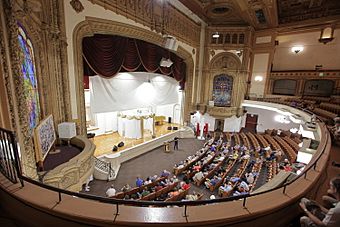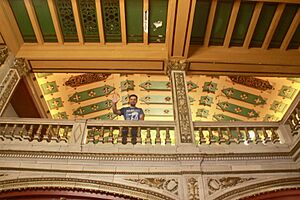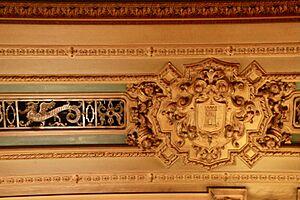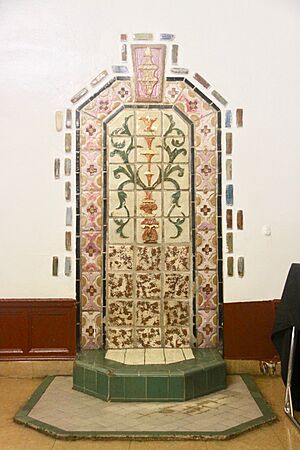State Theatre (Los Angeles) facts for kids

Interior of the State Theatre, 2017
|
|
| Former names | Loew's State Theatre |
|---|---|
| Address | 703 S. Broadway |
| Location | Los Angeles, California |
| Coordinates | 34°02′42″N 118°15′13″W / 34.0451189°N 118.2536541°W |
| Owner | Broadway Theater Group |
| Type | Movie theatre |
| Capacity | 2,450 |
| Construction | |
| Opened | November 12, 1921 |
| Architect | Weeks & Day |
| Tenants | |
| Universal Church of the Kingdom of God | |
| Designated: | March 20, 1991 |
| Reference #: | 522 |
| Designated: | May 9, 1979 |
| Part of: | Broadway Theater and Commercial District |
| Reference #: | 78000687 |
The State Theatre, once known as Loew's State Theatre, is a famous movie theater in Downtown Los Angeles. It is located at 703 S. Broadway. This theater first opened its doors in November 1921. It is part of the historic Broadway Theatre District.
Contents
History of the State Theatre
The State Theatre was designed by architects Charles Peter Weeks and William Day. They created it in a beautiful Spanish Renaissance style.
Building and Design
The theater is part of a large 12-story office building from 1921. This building is called the United Building. It sits at the corner of S. Broadway and 7th Street. When it was finished, it was the biggest brick-covered building in the world. It is still one of the largest in Los Angeles today.
The theater originally had two main entrances. One was on Broadway and the other on 7th Street. The 7th Street entrance was closed in 1936.
Early Days and Features
The State Theatre was built in a very busy part of Downtown Los Angeles. This helped it become a very successful theater. When it first opened, its projection booth was said to be the largest in the world. It even had a shower for the projectionist! The theater also had a Moller organ, which was later replaced with a Wurlitzer organ in 1925.
In 1929, a group called the Gumm Sisters performed vaudeville at the theater. Their lead singer was known as “Leather Lungs.” This was because her voice was so strong, you could hear her clearly at the back of the huge auditorium. Vaudeville shows stopped at the State Theatre in 1935. The Gumm Sisters then moved to Culver City. There, “Leather Lungs” changed her name to Judy Garland and became a famous movie star.
In 1931, the theater showed the first full-length movie of a football game. It was a game where USC beat Notre Dame. People loved it so much that the theater manager played the football movie over and over. It broke all previous records for how many people came to the theater!
Changes Over the Years
In 1949, United Artists took over the theater. They changed its name from Loew's State to simply the State Theatre. Then, in 1963, Metropolitan Theatres bought the State. They started showing many movies dubbed into Spanish. Metropolitan Theatres closed the State in 1997.
The main seating area of the theater is almost square. It originally had seats for 2,450 people. Today, it can hold 2,387 people. Above the stage, there is a small statue of a seated Billiken figure. This figure is a good luck charm. The theater also has a colorful fire safety curtain. It shows a futuristic city with unique towers, surrounded by planets and comets.
The Broadway Theatre Group manages the State Theatre today. They also manage other famous theaters in the Broadway Theatre District. These include the Palace, Los Angeles, and Tower theaters.
The Universal Church of the Kingdom of God used to lease the theater. They called it the "Cathedral of Faith." Their lease ended in early 2018. Since then, the owners have been looking for a new tenant.
Filming Location
The State Theatre has been used as a location for filming movies and music videos.
- Gypsy (1993)
- What's Love Got To Do With It (1993)
- Wild Bill (1995)
- "A Thousand Miles" - Vanessa Carlton (Music Video)
In the music video for "A Thousand Miles", Vanessa Carlton is seen playing her piano outside the theater. People are in the background, including a breakdancer. For the movie Wild Bill, the stage area was decorated with special drapes. These decorations were still there in 2011.
See also
- List of Los Angeles Historic-Cultural Monuments in Downtown Los Angeles
- List of contributing properties in the Broadway Theater and Commercial District
Images for kids
 | Roy Wilkins |
 | John Lewis |
 | Linda Carol Brown |










